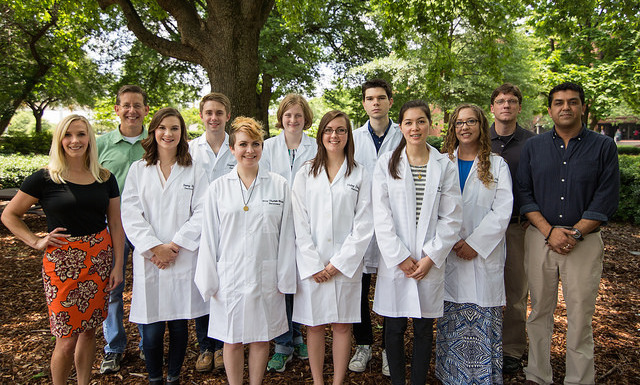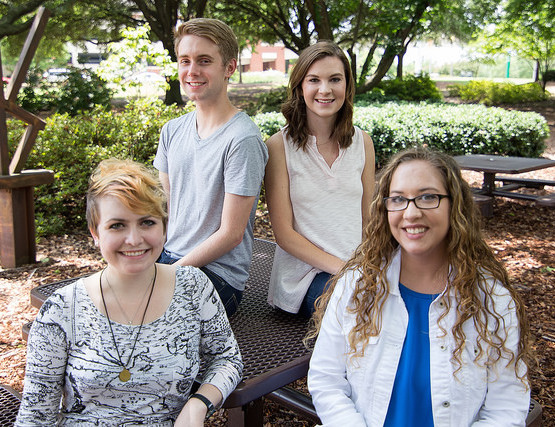
Honors Neuroscience Summer Research Academy group shot: From left to right: Dr. Cristin Gavin, Dr. Scott Wilson, Remy Meir, Cooper Bailey, Mary-Elizabeth Winslett, Stacey Niver, Haley Edwards, Ben Boros, Courtney Walker, Danielle Hurst, Dr. David Knight, and Dr. Rajesh Kana.Participants in the 10-week program are actively conducting research in a primary faculty member’s lab on UAB’s campus and have demonstrated excellence in academic coursework, promise in basic laboratory skills, and expressed interest in further professional development.
Their award provides room and board for the summer and a research award (for the mentors) to support the student's work in the lab.
Eight students are participating in the Honors Neuroscience Summer Research Academy this summer. Four are working in psychology labs and four are working in School of Medicine labs (Neurobiology, Psychiatry and Behavioral Neurobiology, and Neurology).
Here are the stories of the four students working in psychology labs this summer:
Remy Meir
I am currently working under Dr. Sorge in the Psychology Department at UAB. Last semester, I worked to show that the drug baclofen works synergistically with opioids, such as morphine and fentanyl, to create an analgesic effect. This summer, I am running conditioned place preference testing with mice in order to see if the drug baclofen works synergistically with opioids in the aspect of rewarding effect. What we hope to see is that the two drugs do not exhibit synergy in the rewarding effect. The desired outcome is evidence that these drugs work synergistically in pain relief, but not in rewarding effect in order for better administration of prescription opioids. I plan on pursuing a PhD in neuroscience following my undergraduate studies. This program is very beneficial to my future plans, because it establishes my love for research and gives me a strong research background that can only enhance my application for graduate schools. Research is such a valuable experience because all of science is dependent on what one does in the lab. The things we work on in our labs may seem small scale, but if something valuable is found that is the sort of information that the doctors and engineers then need to better their own field. I have loved this experience because I have gotten incredibly close to my lab mates and we have become a big family. I am also constantly learning new techniques that help me grow as a scientist and I could not be more thankful for such an incredible experience.Mary-Elizabeth Winslett
 Honors Neuroscience Summer Research Academy students working in psychology labs, left to right: Mary-Elizabeth Winslett, Cooper Bailey, Remy Meir, Danielle HurstMy research is focused on neuroimaging in a population with Autism Spectrum Disorders (ASDs). I do this research under the supervision of my mentor, Dr. Rajesh Kana, as part of the Department of Psychology’s Cognition, Brain, and Autism Laboratory. Specifically, I am conducting a quantitative meta-analysis of available literature related to facial/emotional processing in the fusiform gyrus (FG) in individuals with ASD as compared to typically developing individuals. The process involves hours of screening articles for relevant data, from which I will extract coordinates to run an activation-likelihood estimation (ALE). The results of this analysis will be interpreted with respect to the mid-fusiform sulcus (MFS) of the FG and will hopefully provide some insight into the characterization of this region in an ASD population. The summer research academy has provided me with the means to work on this project over the summer, allowing me the time to take on more responsibilities in the lab and conduct my research quite thoroughly. I intend to continue in the field of neuroimaging in ASD through graduate school and into a career. This opportunity allows me to spend time doing research in my specific area of interest and will hopefully segue well into positions doing similar research in the future.
Honors Neuroscience Summer Research Academy students working in psychology labs, left to right: Mary-Elizabeth Winslett, Cooper Bailey, Remy Meir, Danielle HurstMy research is focused on neuroimaging in a population with Autism Spectrum Disorders (ASDs). I do this research under the supervision of my mentor, Dr. Rajesh Kana, as part of the Department of Psychology’s Cognition, Brain, and Autism Laboratory. Specifically, I am conducting a quantitative meta-analysis of available literature related to facial/emotional processing in the fusiform gyrus (FG) in individuals with ASD as compared to typically developing individuals. The process involves hours of screening articles for relevant data, from which I will extract coordinates to run an activation-likelihood estimation (ALE). The results of this analysis will be interpreted with respect to the mid-fusiform sulcus (MFS) of the FG and will hopefully provide some insight into the characterization of this region in an ASD population. The summer research academy has provided me with the means to work on this project over the summer, allowing me the time to take on more responsibilities in the lab and conduct my research quite thoroughly. I intend to continue in the field of neuroimaging in ASD through graduate school and into a career. This opportunity allows me to spend time doing research in my specific area of interest and will hopefully segue well into positions doing similar research in the future.

